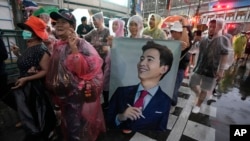Pita Limjaroenrat, the progressive leader of the Move Forward Party (MFP), which won the biggest bloc in Thailand’s parliament in the May national election, is on a political hiatus. The military-appointed Senate blocked his bid to become prime minister and the conservative Constitutional Court tossed legal curveballs to keep him sidelined. Pita, a graduate of Harvard Kennedy School and the MIT Sloan School of Management, sat down with VOA Thai on October 31 just after receiving recognition from Time magazine as a leader of the future. This interview has been edited for clarity and brevity.
VOA Thai: You met with many people while in the U.S. Why?
Pita: The starting point was to receive Time magazine’s Time100 Next. And having come this far, I decided to plan meetings that could be of use to the MFP and the country.
Despite being ordered to pause my role as a member of parliament, I am still a chief adviser to the MFP leader, and also a Thai citizen who wants to see U.S.-Thai relations become closer. I think I learned things that can be used in rebalancing international relations.
VOA Thai: How do you position yourself politically?
Pita: Certainly, outside the parliament. For the party’s internal matters, it is still far from perfection. More people coming in means party management will have to be more systematic to maintain credibility with the people while not losing individuals’ identities.
And for the public, I will have stories from the U.S. to tell them. We will see both problems and potential for solutions or creating economic opportunity. For example, I learned of new technology from MIT that helps bedridden patients who live alone, a bra that can analyze the wearer’s risk of having breast cancer and using the Internet of Things to anticipate flash floods or wildfire. I am interested in how to use government-to-government or people-to-people policy to bring them to Thailand.
VOA Thai: How are you dealing with the failure of your bid to be prime minister?
Pita: I don’t feel anything because I managed expectations. I am 43. I have lived with Thai politics for over 20 years and have seen how hostile it is. It is me knowing that political harassment was not something that happened only to me. So, I see it is not something personal to be sad about.
I understand it, but I will not give up. I will find ways to change the game so Thailand has a full-fledged democracy, not authoritarianism that allows some degree of competition but fixes the results when they are not in its favor.
I want to turn tears into power for the next election. After that, we have to describe how systematic, full-fledged democracy can be useful to the people. It would set us off to not have someone to kick us down via coup every five years on average. That is the definition of democracy. It is not easy, but at least there is a self-correction mechanism that allows trial and error.
VOA Thai: If you were prime minister, how would you deal with the Israel-Hamas war, given that Hamas holds 23 Thais hostage, and the Thai government is in talks with Iran for release of the agricultural workers?
Pita: I am ready to cooperate with the Thai government to solve the problem. What we can offer is that we have our own labor wing that used to collect all workers’ contact infrastructure across Israel.
I think we should think of creating a chance for humanitarian pauses because the population in Gaza is mostly children, of which thousands have already died.
We [Thailand] have no involvement in the conflict, but we have workers there. In the shortest term, it should be about the [return of the] hostages, then our workers’ well-being in Israel, and then the chance for them to return to work. Everything must be done carefully, and I think the Thai government is doing so right now.
When I was in Washington, I met those who are involved, the Office of the Special Presidential Envoy for Hostage Affairs, and listened to them in Congress. I will pass on [what I learned] to Thailand’s House Committee on Foreign Affairs, and the Ministry of Foreign Affairs.




